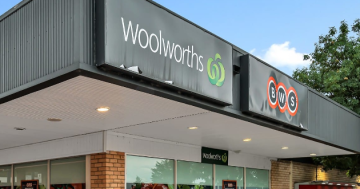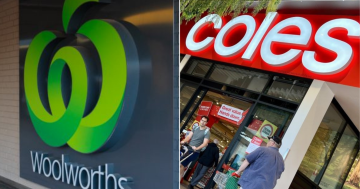
Julius Sumner Miller: “A glass and a half of milk in every 200 g block …” It’s been a while since a block was 200 g. Photo: Screenshot.
There’s a crackdown underway on shrinkflation.
What’s shrinkflation? The snappy economic term – blending the words “shrink” and “inflation” – describes the process of items for sale being reduced in size or quality while their prices remain the same.
The practice is also sometimes known as “weigh-out”, “package downsizing” or “price architecture”.
However it’s described – the Federal Government has declared war on it.
As part of its fight against dodgy supermarket pricing antics, Labor has shrinkflation in its sights with an initiative it says will save consumers time and money.
To combat shrinkflation in supermarkets and the retail sector, the government is strengthening the Unit Pricing Code to help Australians make accurate and timely price comparisons.
Supermarkets that fail to comply face substantial penalties.
Prime Minister Anthony Albanese said shrinkflation was becoming increasingly common with the supermarket price remaining the same – or made even higher in some instances.
He said the practice was taking advantage of Australians doing their groceries and the new measures should help them get a fairer deal at the checkout.
“Tackling shrinkflation through stronger unit pricing and new penalties is part of our plan to get a better deal for Australians,” Mr Albanese said.
“We are also making changes to make sure the ACCC [Australian Competition and Consumer Commission] is a tough cop on the beat, while also encouraging more competition and making sure there are significant consequences for supermarkets who do the wrong thing.”
Unit pricing helps consumers see the price of products by volume, weight or per unit – allowing them to spot good value for money rather than be tricked by unchanged packaging hiding less product.
The government intends to: improve readability and visibility of unit pricing in stores; address inconsistent use of units of measure across supermarkets; expand the scope of retailers covered by the code; introduce more specific prominence and legibility requirements; and improve the use of unit pricing in cross-retailer price comparisons.
But first the government is consulting on the changes.
It follows the recently released ACCC Interim Supermarket Inquiry Report, which found almost 90 per cent of consumers always or often used unit pricing when deciding what products to buy.
Through the course of the inquiry, stakeholders raised concerns about how supermarkets applied unit pricing in Australia – including the size and font of print on in-store labels and the inconsistent units of measure being used to price the same products.
Mr Albanese said strengthening the code would ensure supermarkets were providing the information shoppers needed to find the best deal, in-store or online.
A consumer awareness campaign will also be funded through the ACCC.
Assistant Treasurer Stephen Jones said Australians were doing it tough and the government wouldn’t accept businesses taking advantage of consumers.
“Misleading practices around pricing are illegal and completely inappropriate. The bar needs to be raised significantly,” Mr Jones said.
“Australian consumers deserve fair prices, not dodgy discounts. That’s why we’ve empowered the ACCC to act in the interests of consumers and crack down on dodgy practices immediately.”
Assistant Minister for Competition Andrew Leigh said the government wanted a supermarket industry that was fair for families and farmers.
“Competition is the consumer’s friend. We’re working to hold supermarkets to account by providing consumers with the information they need to make the best decisions,” Dr Leigh said.
An extra $30 million was this week allocated to the ACCC to boost its crackdown on the supermarket industry.
Original Article published by Chris Johnson on Riotact.
















